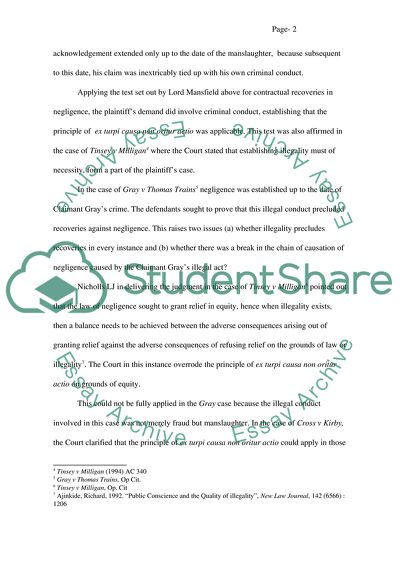
- Home
- Free Samples
- Premium Essays
- Editing Services
- Extra Tools
- Essay Writing Help
- About Us
- Studentshare
- Subjects
- Miscellaneous
- Law Case Analysis
Law Case Analysis - Essay Example

- Subject: Miscellaneous
- Type: Essay
- Level: Undergraduate
- Pages: 4 (1000 words)
- Downloads: 0
- Author: lilyan83
Extract of sample "Law Case Analysis"
The principle that was examined in this case was the defense of “ex turpi causa non oritur actio” (my cause of action cannot be based upon my own wrongdoing). This principle was first laid out in the case of Holman v Johnson, in which Lord Mansfield stared that the question to be examined is whether the plaintiff’s demand “is founded upon the ground of any immoral act or contract, or upon the ground of his being guilty of any thing which is prohibited by a positive law of this country.
”2 In this instance Claimant Gray was a victim of the Ladbroke Grove Rail crash on 5th October 1999. His physical injuries were minor but he suffered from acute Post Traumatic Stress Disorder, as a result of which he stabbed a stranger to death on 19th August 20013. The defendants in this case acknowledged their responsibility for their negligence and damages including lost earnings caused to the Plaintiff. But this acknowledgement extended only up to the date of the manslaughter, because subsequent to this date, his claim was inextricably tied up with his own criminal conduct.
Applying the test set out by Lord Mansfield above for contractual recoveries in negligence, the plaintiff’s demand did involve criminal conduct, establishing that the principle of ex turpi causa non oritur actio was applicable. This test was also affirmed in the case of Tinsey v Milligan4 where the Court stated that establishing illegality must of necessity, form a part of the plaintiff’s case. In the case of Gray v Thomas Trains5 negligence was established up to the date of Claimant Gray’s crime.
The defendants sought to prove that this illegal conduct precluded recoveries against negligence. This raises two issues (a) whether illegality precludes recoveries in every instance and (b) whether there was a break in the chain of causation of negligence caused by the
...Download file to see next pages Read MoreCHECK THESE SAMPLES OF Law Case Analysis
Franchise Law Case Analysis
Tort Law: Case Analysis
Contract Law Case Analysis
Commercial Law Case Analysis
Business Law Case Analysis
Business Law Case Analysis
Immigration Law Case Analysis
Tort Law Case Analysis

- TERMS & CONDITIONS
- PRIVACY POLICY
- COOKIES POLICY